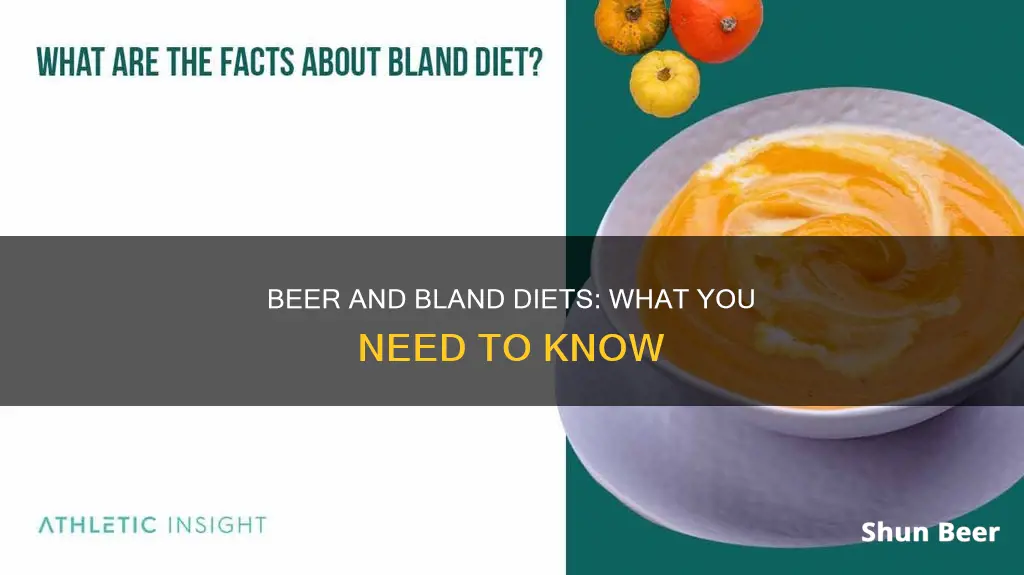
A bland diet is a doctor-recommended diet for people with gastrointestinal inflammation from infections, diverticulitis, or flares of chronic conditions like Crohn's disease or ulcerative colitis. It is also recommended for people with gastrointestinal conditions, including acid reflux and peptic ulcers. The diet includes foods that are soft, not spicy, and low in fiber. Alcoholic beverages are not allowed in a bland diet, and beer, being an alcoholic drink, is not recommended. Beer is also associated with an increased waist circumference and is calorie-dense, which can lead to an unhealthy weight gain.
What You'll Learn
- Beer is not recommended on a bland diet due to its alcohol content
- A bland diet is a temporary measure to help optimise a patient's health
- A bland diet is used to treat gastrointestinal issues and requires soft, low-fibre foods
- Alcohol is linked to an increased risk of visceral fat, which is dangerous to health
- Bland diets are used after stomach and intestinal surgeries to aid recovery

Beer is not recommended on a bland diet due to its alcohol content
A bland diet is often recommended by doctors to address gastrointestinal inflammation, infections, or chronic conditions such as Crohn's disease or ulcerative colitis. It is also beneficial for those with acid reflux, peptic ulcers, and other gastrointestinal complaints. The diet includes soft, low-fibre, and easily digestible foods that are not spicy or fried. It is meant to give the digestive system a rest and help manage symptoms.
Alcohol, on the other hand, can irritate the digestive tract and worsen symptoms. It is known to relax the lower oesophageal sphincter, leading to worsening reflux or the development of gastroesophageal reflux disease (GERD). Alcohol is also associated with bigger waistlines and belly fat. This is because when you drink alcohol, the liver burns alcohol instead of fat. Beer, in particular, contributes to excess calories, with a typical beer containing 150 calories. Consuming multiple beers in one sitting can result in a significant calorie overload.
Additionally, alcohol can increase your appetite, leading to the consumption of more high-calorie foods, such as pizza, wings, and other fried foods that are commonly found when drinking beer at bars or parties. This can further contribute to weight gain and digestive issues. Therefore, it is generally recommended to avoid beer and other alcoholic beverages while on a bland diet to give the digestive system the rest it needs and prevent further irritation.
It is important to note that a bland diet is usually a temporary measure and not a permanent solution. Patients should consult with their healthcare provider before starting a bland diet and seek guidance on when they can reintroduce other foods, including alcohol, back into their diet.
Drinking Beer with a Straw: Faster or Fiction?
You may want to see also

A bland diet is a temporary measure to help optimise a patient's health
A bland diet comprises easily digestible foods that are soft in consistency, low in fibre, cooked, and gentle on the gastrointestinal tract. It typically includes low-fat dairy products, eggs, broth, pudding, fruit juices, cream of wheat, tofu, lean meat (such as skinless chicken or fish), bland vegetables (like beetroot, beans, spinach, and carrots), and tea. It is important to note that the diet eliminates raw or uncooked foods, fried foods, spices, seeds, nuts, acidic fruits, whole-grain products, fatty dairy, non-lean meat, dressings, sauces, pickles, alcoholic beverages, strong cheeses, and vegetables that cause excess flatulence.
Beer, being an alcoholic beverage, is not recommended as part of a bland diet. Alcoholic drinks are included in the list of foods and beverages to be avoided while on this diet. This is because alcohol can cause the lower oesophageal sphincter to relax, leading to worsening reflux symptoms or the development of gastroesophageal reflux disease (GERD). Additionally, alcohol is associated with bigger waists and belly fat as it contributes to excess calorie intake, and the liver burns alcohol instead of fat.
It is worth noting that a bland diet is not a permanent solution and should only be followed temporarily under medical supervision. Once a patient's condition improves, a gradual increase in fibre intake is recommended. This is because a long-term bland diet can adversely affect health due to the reduced intake of fibre, which offers important health benefits such as lowering "bad" cholesterol, promoting stable blood sugar levels, nourishing gut bacteria, and aiding in weight management.
While beer is not recommended during a bland diet, it is essential to consult a healthcare provider for personalised advice and recommendations regarding diet and beverage choices. They can provide guidance on when it is appropriate to reintroduce certain foods and drinks, ensuring a safe and effective approach to optimising digestive health.
Beer After a CT Scan: What You Need to Know
You may want to see also

A bland diet is used to treat gastrointestinal issues and requires soft, low-fibre foods
A bland diet typically includes foods such as:
- Tender meats like fish, poultry, pork, and beef
- Thoroughly cooked skinless, seedless vegetables like potatoes, squash, and carrots
- Plant-based milk alternatives such as almond, walnut, flax, and coconut milk
- Fruit juices (although people with acid reflux may need to avoid citrus and tomato juices)
- Puddings and custard
- Refined grains like rice, white bread, cream of wheat, and pasta
- Dairy, if tolerated
- Weak black tea, green tea, and some herbal teas
It is important to note that a bland diet should only be followed for a short period, as advised by a healthcare professional. This is because a long-term bland diet can lead to constipation and adverse changes in overall health due to the lack of fibre.
Now, let's address the question of whether you can drink beer on a bland diet. Beer is an alcoholic beverage, and alcohol is generally not considered compatible with a bland diet. Alcoholic beverages are among the drinks that should be avoided while on a bland diet, as they can worsen reflux symptoms and increase the risk of developing gastroesophageal reflux disease (GERD). Beer, in particular, tends to get blamed for "beer bellies" due to its high calorie content and the tendency for excess calories to be stored as fat in the belly area.
Therefore, it is recommended to avoid drinking beer while on a bland diet. Alcoholic beverages, in general, should be limited or avoided to support the healing of the gastrointestinal tract and prevent further irritation.
Concussion and Beer: A Dangerous Mix?
You may want to see also

Alcohol is linked to an increased risk of visceral fat, which is dangerous to health
A bland diet is a physician-prescribed diet that is used to help optimise a patient's overall health condition. It is a useful modality for managing patients with gastrointestinal issues, acid-peptic disease, excess gas formation, or specific post-surgical conditions. The bland diet is sometimes referred to as a "low-residue diet" or "soft diet". It consists of easily digestible foods that are soft, low-fibre, cooked, and gentle on the gastrointestinal tract. Typically, a bland diet includes low-fat dairy products, eggs, broth, pudding, fruit juices, cream of wheat, tofu, lean meat (such as skinless chicken or fish), bland vegetables (like beetroot, beans, spinach, and carrots), and tea. Fried foods, spices, seeds, nuts, alcoholic beverages, whole-grain bread, fatty dairy products, non-lean meat, dressings, sauces, and strong cheeses are usually avoided in this diet.
Alcoholic beverages are not recommended as part of a bland diet. In addition to worsening reflux symptoms, alcohol consumption is linked to an increased risk of visceral fat, which poses a danger to health. Visceral fat is a type of belly fat found deep within the abdominal cavity, surrounding important organs such as the stomach, liver, and intestines. While some visceral fat is normal and even beneficial, excessive visceral fat can lead to serious health issues. These include diabetes, heart disease, and stroke.
The link between alcohol consumption and visceral fat has been observed in studies. Research has shown that moderate alcohol intake is positively correlated with abdominal fat distribution, likely due to an enlarged visceral fat area. This correlation was found to be independent of other factors such as BMI, cigarette smoking, and physical activity. Additionally, alcohol intake was associated with increased plasma androgenicity, specifically higher levels of total and free testosterone.
The mechanism behind the link between alcohol and visceral fat may be partly explained by the effect of alcohol on plasma androgens. However, it is important to note that the relationship between alcohol intake and fat distribution is complex and may be influenced by various factors. Nonetheless, limiting alcohol intake is generally recommended for maintaining a healthy weight and reducing the risk of visceral fat accumulation.
To summarise, alcohol consumption is associated with an increased risk of visceral fat accumulation, which can have detrimental effects on health. Therefore, it is advisable to limit alcohol intake, especially when following a bland diet or aiming to improve overall health.
Beer and Thyroid Lobectomy: What You Need to Know
You may want to see also

Bland diets are used after stomach and intestinal surgeries to aid recovery
A bland diet is often recommended after stomach and intestinal surgeries to aid recovery. It is a temporary measure to help rest and heal the gastrointestinal tract. The diet is designed to be soft, low-residue, and easily digestible, giving the body time to recover from surgery.
The diet includes soft, easily digestible foods that are gentle on the stomach and intestines. This includes low-fat dairy products, eggs, broth, pudding, fruit and vegetable juices, lean meats, and bland vegetables. It is important to avoid raw, spicy, and fried foods, as well as whole grains, fatty dairy, and alcoholic beverages. Alcohol should be avoided or strictly limited, as it can cause a worsening of reflux symptoms.
After abdominal surgery, it is important to take small bites, chew well, and eat slowly to aid digestion. Eating frequent, small meals can also help reduce the burden on the stomach. It is also recommended to reduce the fiber and fat content of meals, as these can be irritating to the stomach after surgery.
In addition to dietary changes, it is important to stay well-hydrated by drinking plenty of fluids and consuming enough calories and protein to support the healing process.
The bland diet is a useful tool to aid in the recovery process after stomach and intestinal surgeries, providing gentle nutrition to the body as it heals. It is important to follow the recommendations of a healthcare provider and seek guidance from a dietitian or nutritionist to ensure a healthy and balanced diet during the recovery period.
Beer and Stroke Recovery: What You Need to Know
You may want to see also
Frequently asked questions
Beer and other alcoholic beverages are not recommended for those on a bland diet. Alcohol can cause worsening of reflux symptoms and is associated with an increased risk of developing GERD.
A bland diet is a diet of soft, low-fibre, and easily digestible foods that are gentle on the digestive system. It is often recommended for those with gastrointestinal issues.
Foods that are typically included in a bland diet include low-fat dairy products, eggs, broth, pudding, fruit juices, lean meats (such as skinless chicken or fish), and bland vegetables (like beets, beans, spinach, and carrots).
Fried foods, spices, seeds, nuts, acidic fruits, whole grains, fatty dairy, non-lean meats, dressings, sauces, pickles, strong cheeses, and vegetables that cause excess flatulence (such as cabbage and onion) are generally avoided on a bland diet.
A bland diet can help to reduce digestive issues such as bloating, diarrhea, gas, and nausea. It is particularly beneficial for those with gastrointestinal conditions, such as acid reflux, peptic ulcers, or inflammatory bowel disease.







